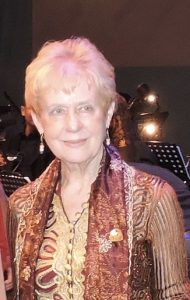Margaret Kartomi

Professor Emerita Margaret Kartomi
- Post Nominals: AM, FAHA
- Fellow Type: Fellow
- Elected to the Academy: 1982
- Section(s): Asian Studies, Arts
Biography
Professor Kartomi Emerita is Director of the Music Archive of Monash University (MAMU) which she founded in 1975. It contains her many music field recordings (mainly from Indonesia), recordings by other ethnomusicologists and musicologists, and musical instruments, dance and drama data, textiles, writings, books, and collectors’ bequests from around the world. MAMU administers the Margaret Kartomi Gallery of Musical Instruments and Artefacts in the Performing Arts Building at Monash University, Clayton. The current exhibition in the Gallery is open and free to the public from 10am-5pm Mondays to Fridays or by appointment.
Margaret Kartomi obtained her Bachelor of Music with first-class honours, Bachelor of Arts, and Diploma of Pianoforte at the University of Adelaide and trained as a musicologist and ethnomusicologist at Humboldt University where she obtained her Doctorate of Philosophy in Musicology and Southeast Asian Studies (1968). She was first appointed in Monash University’s Department of Music in 1968 and served as Head of the School of Music from 1989 to the early 2000s, when she brought in a new pedagogy and instituted new degrees. She pioneered the teaching of and research into the musics of Asia at Monash University, and is the world authority on the music cultures of Sumatra. She has deposited her extensive field recordings from many provinces of Indonesia and beyond in the National Library in Jakarta and her research data and correspondence in the National Library of Australia.
She has twice been elected President of the Musicological Society of Australia, was elected Corresponding Member of the American Musicological Society, and is also a member of the International Musicological Society, the International Council for Traditional Music, and the Society for Ethnomusicology. She is an Editorial Board member of the University of Chicago Press Ethnomusicology Monograph Series and has served as editor of Musicology Australia and on the editorial board of several other musicological journals. She convened the Intercongressional Symposia of the International Musicological Society in Melbourne in 1988 and 2004 and three international conferences on the music cultures of Sumatra.
Professor Kartomi’s research interests and publications focus on musicological and ethnomusicological theory, organology, historiography, ethnomusicology of Indonesia and Southeast Asia, Baghdadi Jewish music, and Aboriginal Australian children’s music. She was winner of the Prix du Disque of the German Government for the best ethnographic record (of Sumatran Mandailing music) in 1983 and co-winner in 1999. In 1991 she was awarded Member (AM) of The Order of Australia for services to music and in 2003 she was honoured with the Centenary Medal for services to music and Southeast Asian Studies. She received the Sir Bernard Heinze medal for contributions to music in Australia, Japan’s Fumio Koizumi prize for achievements in ethnomusicology, and an order from the government of Lampung (Indonesia) for her Sumatra research with the title Ratu Berlian Sangun Anggun (Beautiful Queen Jewel). A Festschrift written by research colleagues and former students in her honour was presented to her on her 65th birthday.
She has published around 150 journal articles and chapters in books and is author, author-editor or editor of ten books including Musical Instruments of Indonesia (1985), On Concepts and Classifications of Musical Instruments (1990), The Gamelan Digul and the Prison Camp Musician Who Built It (2002), Musical Journeys in Sumatra (2012), and Performing the Arts of Indonesia: Malay Identity and Politics in the Music, Dance and Theatre of the Riau Islands (2019).
